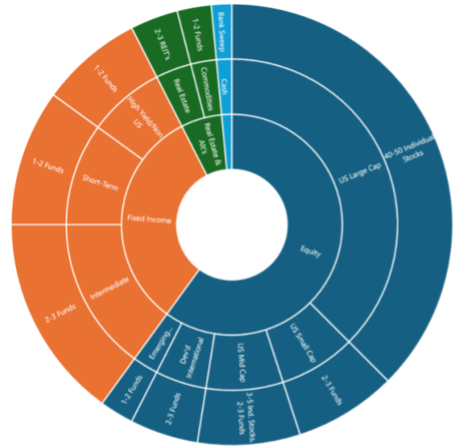Discretionary Portfolio Management
With our discretionary management services, we take the reins on your investment portfolio, handling day-to-day decisions to align with your specific objectives and risk tolerance. Each portfolio is carefully constructed to reflect your unique goals, incorporating:
Individual Equities
We focus on large- and mid-cap U.S. companies that are well-known and widely recognized. A typical portfolio includes 45–50 individual equities to help ensure diversification and alignment with your financial goals.
Mutual Funds & Exchange Traded Funds (ETF’s)

Representative Portfolio Construction of a 60/40 Portfolio
(Asset Class Weights and Security Composition/Quantities may vary)
To complete your portfolio, we use mutual funds, ETFs, and other pooled securities. These investments provide exposure to small-cap U.S., international, emerging markets, and taxable fixed income allocations. With access to over 4,000 institutional share class and load-waived funds and ETFs through Raymond James, we help ensure cost efficiency and diversity. Most portfolios include 10–15 funds or ETFs, while smaller portfolios (under $250k) may consist entirely of pooled securities.
Tax Strategies and Risk Management
We work with you to integrate tax sensitivity and hedging strategies into your portfolio when appropriate. Tools like covered calls and option collars can help provide an added layer of income or downside protection. Additionally, we collaborate with your tax professionals to help minimize your current and future tax liabilities, helping to ensure your investments work efficiently for you.
This service is provided exclusively on a fee basis, ensuring our interests are aligned with yours as we focus on your long-term success.
The Wealth Managers at The Lindsey-Trost Group participate in the Steward Partners Portfolio Management program. The Portfolio Management program is an investment advisory program in which the client's Wealth Manager invests the client's assets on a discretionary basis in a range of securities. The Portfolio Management program is described in the applicable Steward Partners ADV Part 2, available at www.adviserinfo.sec.gov or from your Wealth Manager.
International investing may not be appropriate for every investor and is subject to additional risks, including currency fluctuations, political factors, withholding, lack of liquidity, the absence of adequate financial information, and exchange control restrictions impacting foreign issuers. These risks may be magnified in emerging markets.
Investing in smaller companies involves greater risks than those associated with investing in more established companies, including significant stock price fluctuations and illiquidity.
REITs are subject to special risk considerations similar to those associated with the direct ownership of real estate. Real estate valuations may be subject to factors such as changing general and local economic, financial, competitive, and environmental conditions. REITs may not be appropriate for every investor. Dividend income from REITs will generally not be treated as qualified dividend income and therefore will not be eligible for reduced rates of taxation.